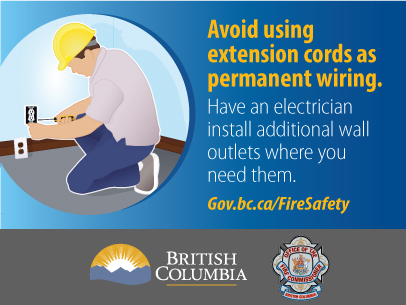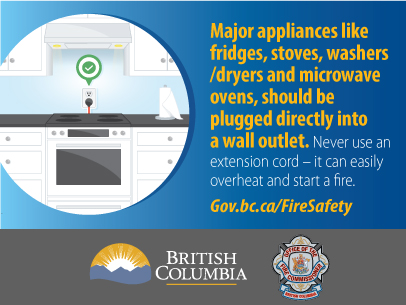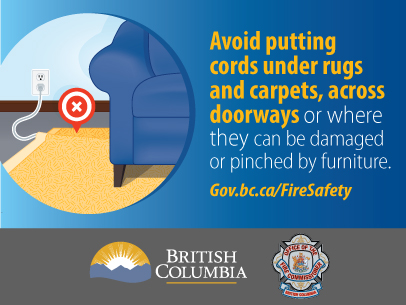Electrical safety social media toolkit
Electricity helps make our lives easier but its power and potential for fire-related hazards shouldn't be overlooked. Learn more about how to stay safe from electrical fires.
Social media toolkit
Messages to share
These key messages have been formatted to be used in a post. Copy and paste them, or use them to complement your own message.
Indoor electrical safety
- Major appliances (refrigerators, dryers, washers, stoves, air conditioners, microwave ovens, etc.) should be plugged directly into a wall receptacle outlet. Extension cords and plug strips should not be used.
- Extension cords should only be used temporarily. Have a licensed electrician install additional wall outlets where you need them. Find one at www.technicalsafetybc.ca/find-licensed-contractor
- Don’t overload extension cords or wall outlets.
- Check your electrical cords. If they are cracked or damaged, replace them. Don’t try to repair them.
- Use light bulbs that match the recommended wattage on the lamp or fixture.
- Electrical work should only be done by a licensed electrician. Find one at www.technicalsafetybc.ca/find-licensed-contractor
Outdoor electrical safety
- Use lighting, extension cords and power tools that are listed by a qualified test laboratory and make sure they are made for outdoor use.
- Check lighting and extension cords for damage before using. Remember that extension cords aren't meant for long-term use.
- Have a licensed electrician do all electrical work. Find one at www.technicalsafetybc.ca/find-licensed-contractor
- To prevent electrical shock, make sure all your outside electrical receptacles are GFCI (ground-fault circuit interrupter) protected.
Hashtags
#FireSafety #FirePrevention #ApplianceSafety #CheckYourCords #ElectricalFireSafety
Graphics
Download and use the graphics below, either by themselves or add additional information in your post to reinforce the message.
Additional resources
Follow the links below for resources from National Fire Protection Association (NFPA) and the U.S. Fire Administration (FEMA).



